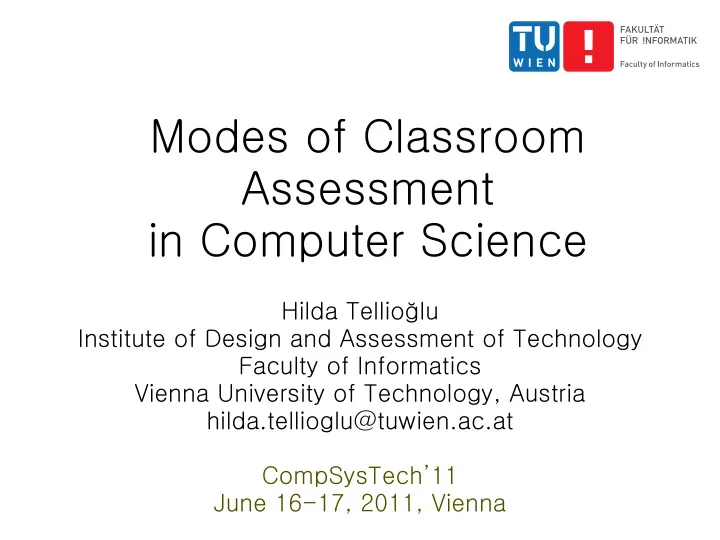

Modes of Classroom Assessment in Computer Science Hilda Tellioğlu Institute of Design and Assessment of Technology Faculty of Informatics Vienna University of Technology, Austria hilda.tellioglu@tuwien.ac.at CompSysTech’11 June 16-17, 2011, Vienna
Outline ‣ Classroom assessment ‣ 2 Case settings - Assessment for learning - Assessment of learning ‣ Technology for assessment of learning ‣ Modes of classroom assessment ‣ Conclusions Hilda Tellioğlu, CompSysTech’11, June 16-17, 2011, Vienna, Austria 2
Classroom assessment ‣ promotes achievement in low-performing schools [4] ‣ low-performers control their own success in learning [6] ‣ assessment for learning versus assessment of learning [9] ‣ assessment methods as teaching tools ‣ “communication systems must deliver assessment results into the hands of their intended users in a timely, understandable, and helpful manner” [10, p.16] Hilda Tellioğlu, CompSysTech’11, June 16-17, 2011, Vienna, Austria 3
Classroom assessment ‣ make assessment data available for students in the same context as they were assessed: immediate feedback [1] ‣ make students aware of their knowledge ‣ make teachers aware of the success of their lectures ‣ goal: guarantee the quality of teaching and learning in higher education ‣ result: systematic approach = modes of classroom assessment in higher education Hilda Tellioğlu, CompSysTech’11, June 16-17, 2011, Vienna, Austria 4
Case setting ‣ classroom assessment at the Vienna University of Technology ‣ involving students directly - progress - not failure and defeat ‣ promoting learning, not evaluation and assigning grades ‣ lecture “Cooperative Work” in computer science about meetings Hilda Tellioğlu, CompSysTech’11, June 16-17, 2011, Vienna, Austria 5
Assessment for learning ‣ “What is the role of a moderator, documenter, and devil’s advocate in a meeting?” Hilda Tellioğlu, CompSysTech’11, June 16-17, 2011, Vienna, Austria 6
Assessment for learning ‣ assessment by the teacher - answers on paper, read later for marking - capturing the presence of the students - motivating students to join the lectures - students assess their knowledge before a new subject is introduced in the lecture - attention is directed to the subject coming next - activating students - too much work for teachers - no direct feedback to students for their individual answers - temporally postponed feedback Hilda Tellioğlu, CompSysTech’11, June 16-17, 2011, Vienna, Austria 7
Assessment for learning ‣ peer assessment - each student judges the answer of his or her neighbor first - afterwards the teacher tells the correct answer - each student marks the result and hands it over to its owner - answers corrected immediately - no additional work for the teacher - students become aware of their knowledge in an ad-hoc manner - additional knowledge for judging the answer of someone else - no assessment by the teacher, but by the fellow student - relaxing for students, but competition among students - students get to know each other Hilda Tellioğlu, CompSysTech’11, June 16-17, 2011, Vienna, Austria 8
Assessment of learning ‣ “What is the most important characteristic of cooperation?” Hilda Tellioğlu, CompSysTech’11, June 16-17, 2011, Vienna, Austria 9
Assessment of learning ‣ assessment by the teacher - answers are read and marked by the teacher later ‣ assessment supported by ICT - by short message service (SMS) via mobile phones - a quiz like assessment - to ask short single-choice questions Hilda Tellioğlu, CompSysTech’11, June 16-17, 2011, Vienna, Austria 10
Assessment of learning ‣ assessment supported by ICT - immediate use and evaluation of the data in real-time to all - ad-hoc feedback - indication for the success of the lecture - clarify of possible misunderstanding by direct immediate interaction - technical access for students must be provided Hilda Tellioğlu, CompSysTech’11, June 16-17, 2011, Vienna, Austria 11
Technology for assessment of learning Hilda Tellioğlu, CompSysTech’11, June 16-17, 2011, Vienna, Austria 12
Modes of classroom assessment Hilda Tellioğlu, CompSysTech’11, June 16-17, 2011, Vienna, Austria 13
Conclusions ‣ classroom assessments increase confidence of students ‣ classroom assessments offer different modes to modify teaching and learning activities ‣ our approach shows how to improve classroom assessments by - making lectures more dynamic - making students curious about the contents of lectures - improving the fun factor during learning - giving teachers a feedback about their teaching - involving students in lectures Hilda Tellioğlu, CompSysTech’11, June 16-17, 2011, Vienna, Austria 14
Thanks for your attention! Modes of Classroom Assessment in Computer Science Hilda Tellioğlu Institute of Design and Assessment of Technology Faculty of Informatics Vienna University of Technology, Austria hilda.tellioglu@tuwien.ac.at CompSysTech’11 June 16-17, 2011, Vienna
Recommend
More recommend